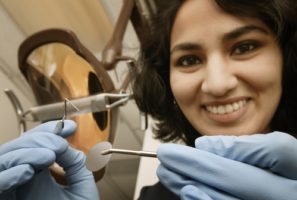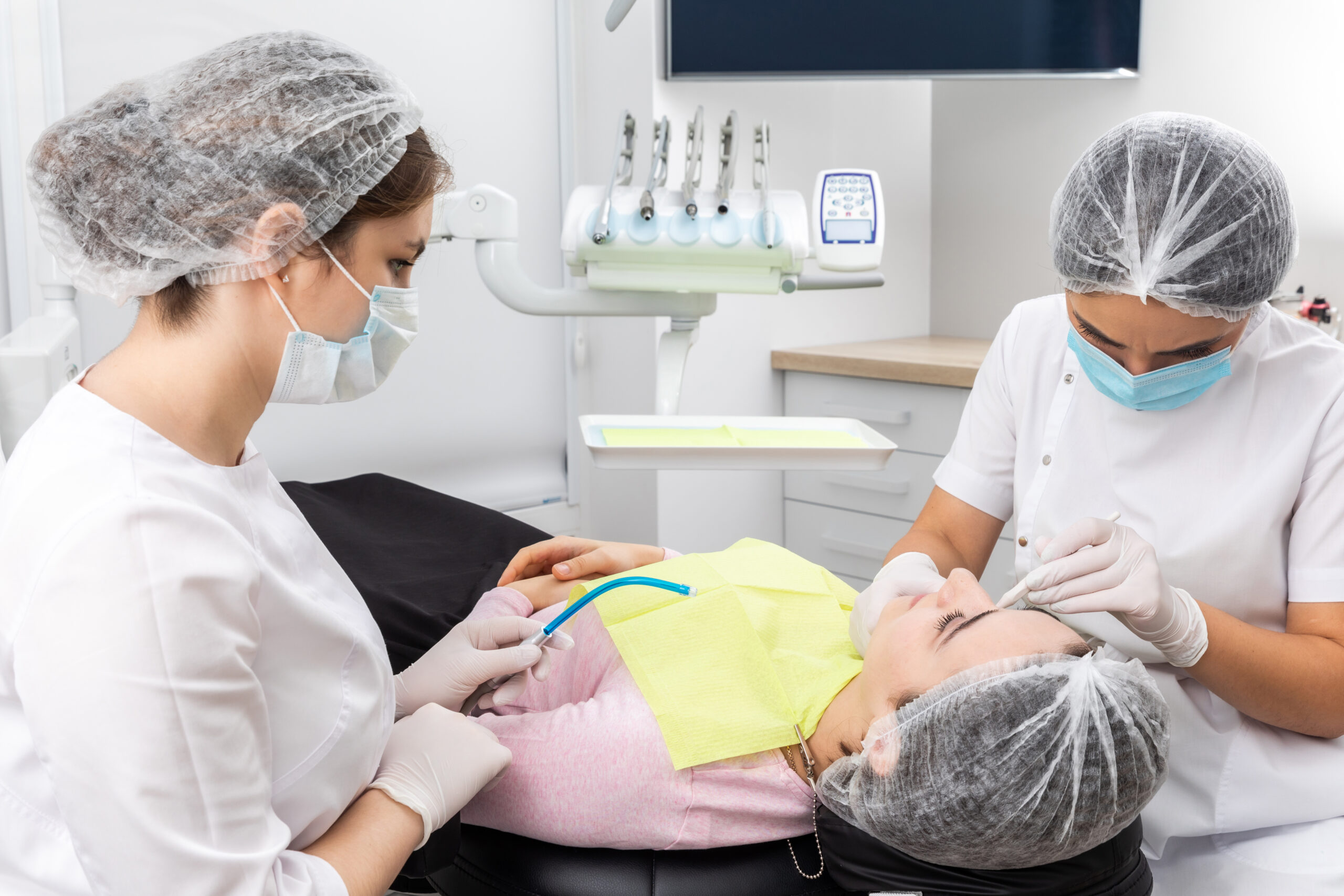A dental hygienist is a career move one step beyond a dental assistant and works directly with patients. A dental assistant is a basic entry-level position and doesn’t work directly with patients. If you’ve ever gone to the dentist, you probably spent more time with a dental hygienist than you did with the dentist. A hygienist is the person who cleans your teeth, talks to you about oral care and, undoubtedly, reminds you, yet again, about the importance of flossing.
For any number of reasons, lots of people are afraid of the dentist. Some get their teeth cleaned twice a year regardless of their fear. Others are so scared that they never go.
One of our colleagues recently had her teeth cleaned and talked to her dental hygienist, Tabitha, about the fear people had of dentists. She said, “Older patients are more afraid than younger ones. As dental care, and tools, improve, people don’t have as traumatic experiences growing up, so their perception of dentists and hygienists is much different.”
Even if patients are completely unafraid, good hygienists empathize with them and take great care to be gentle and supportive while still doing their job. Although everyone appreciates the knowledge and capabilities of dentists, it’s the front line people who spend the most time with patients.
Do you think you’d like to be a dental hygienist? Not only is it an excellent entry-level position, it also has an education and career path that most people can insert into their daily lives.
Definition
Dental hygienists work alongside dentists, orthodontists and other professionals in the field of dentistry. During training, you’ll learn to use the tools needed to clean and polish teeth. Depending upon where you work, you may use more traditional tools like scrapers. But in highly technical offices you may use ultrasonic, power and laser devices.

Typical duties
Working cooperatively with and under the supervision of a dentist, a significant portion of your day will be spent cleaning and polishing patients’ teeth and educating them about oral health care. In smaller offices, you may also take and develop X-rays, update medical histories and document a patient’s treatment along with any new and ongoing issues. Most offices now enter data directly into a computer while interacting with the patient, so having a high degree of comfort working with technology is vital to your success.
Characteristics
As a dental hygienist, you must possess compassion, patience, and understanding. You also need the following characteristics. . .
- Attention to detail.
- Critical thinking.
- Highly motivated and dependable.
- Interpersonal skills.
- Leadership potential.
- Listening Skills.
- Manual Dexterity.
- Outstanding telephone and customer service etiquette skills.
- Persuasive.
- Reading comprehension.
- Strong communication, organization skills, and customer follow up.
- Time management.
- Work ethic.
Training/education
To become a dental hygienist you will need an associate degree. Within the program, you’ll learn quite a bit about patient care. You will be able to enhance your critical thinking, and problem-solving skills which are essential when providing direct patient care since some of your work will be independent of the dentist. Your program will combine laboratory, clinical, and classroom instruction.
Earning a dental hygienist associate’s degree will prepare you to work with patients from various backgrounds and teach you how to interact with different healthcare professionals.
In addition to dental and science courses, you’ll also encounter liberal arts courses. Classes such as English composition and public speaking will give you a well-rounded experience and prepare you for the working world.
To enter a dental hygiene associate’s degree program, students are usually required to complete a certain number of prerequisite courses with a grade point average of 2.5 or higher. The topics can range from science to communications.
- Anatomy and physiology
- Dental anatomy
- Head and neck anatomy
- Introduction to dental hygiene
- Medical ethics
- Microbiology and immunology
- Nutrition
- Pathology
- Patient/pain management
- Periodontics
- Pharmacology for dental health
- Radiology
If you have an associate’s degree, or even a certificate, and want to advance your career in both opportunities and wages, you can enroll in a degree-completion program. Such a program allows for a hygienist, with about two additional years of education to obtain a baccalaureate degree. To be accepted, you must have a license to practice and possess a minimum 2.5 grade point average in your previous degree program.
Many programs are offered online or in a hybrid format to cater to those hygienists who are already working in the field. This type of curriculum delivery allows you to study and take exams when it is most convenient for you. Many of these programs are considered post-licensure which means you won’t be required to fulfill clinical requirements. A curriculum focused on leadership skills will familiarize you with evidence-based practice and public health dentistry.
Licenses/certifications/registrations
Once you are a graduate of an accredited dental hygienist program, you must take a licensure exam. Each state has slightly different requirements, so contact your state dental board to find out what your state requires. It’s likely you’ll need to be CPR-certified and undergo a background check. As with most medical professionals, you will have to participate in continuing education courses throughout your career. Such courses keep you updated in new methods of dental hygiene, new technology, and further evidence of how good oral health contributes to good overall bodily health.
Alternative careers for dental hygienists
If you enjoy working in the field of dental medicine, but don’t want to work as a hygienist, there are other careers you can pursue with a graduate degree. With additional education, you can work in one of three primary areas
Corporate
- Corporate trainer.
- Dental insurance officer.
- Dental office manager.
- Hospital or nursing home consultant.
- Sales in pharmaceuticals or dental supplies.
Education
- Classroom or clinical instructor.
- Dean of a dental or medical education program.
- Dental hygiene program director.
- Education researcher.
Public Health
- Community clinic administrator.
- Local/state dental public health officer.
All of these career alternatives require a master’s, or graduate degree program which can take between one and two years to complete. In addition to coursework, you may have to do a capstone demonstrating your mastery of concepts and applications you learned throughout your program. You may also have to do additional research in a specific area of dental hygiene that most closely relates to your interest.
If you choose to continue your education, you can apply to a masters-level dental hygiene program. Minimum requirements include:
- Bachelor’s degree in dental hygiene or related field.
- 3.0 or higher grade point average.
- Current, unencumbered dental hygiene license.
- College transcripts.
- Letters of recommendation.
- Scores from the graduate record exam.
Some schools require personal essays, statement of interest, and even your professional resume to be submitted along with your application for admission.
If your interest in dentistry is high enough, you may choose to become a dentist. You will be in school in a minimum of eight years.
Wages and job outlook
According to the Bureau of Labor Statistics, as of 2017, the estimated job growth for dental hygienists between 2016 and 2026 is 20%, which is much faster than the national average. The median annual salary is $74,070, which breaks down to $35.61 an hour.
As the population ages, the demand for dental services will increase, especially as research continues to link oral health to overall health.

